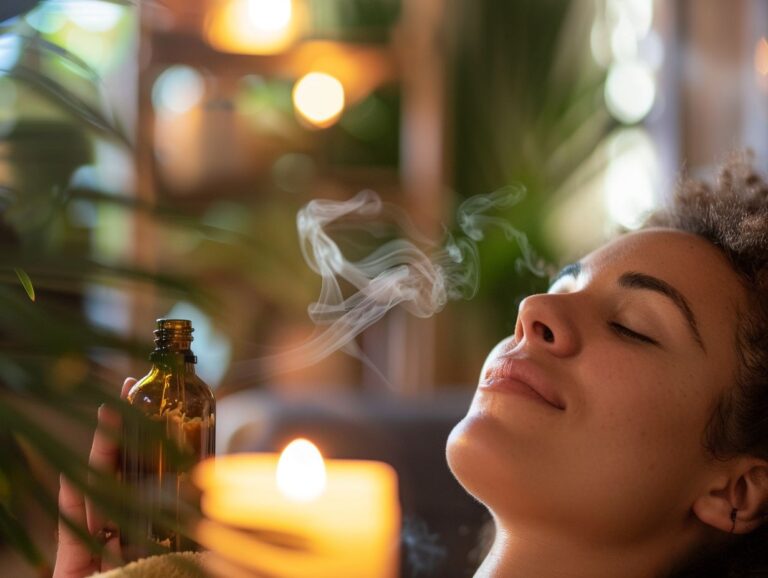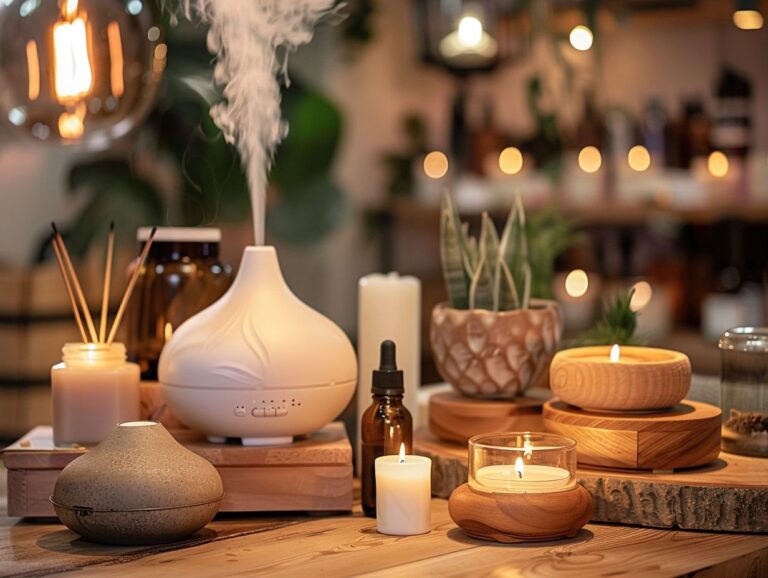What Does Aromatherapy Use Only Mean
Curious about aromatherapy and the meaning of “aromatherapy use only”?
Explore the basics of aromatherapy, including essential oils, carrier oils, and the benefits of this practice.
Learn how to use aromatherapy safely, with tips on diluting essential oils, doing patch tests, and following recommended dosages.
Discover the significance of “aromatherapy use only” for essential oils and carrier oils, focusing on purity, quality, and proper handling.
If you want to enhance your well-being with aromatherapy, this article is a must-read!
Key Takeaways:
What is Aromatherapy?
Aromatherapy is a holistic medicine approach that utilizes essential oils extracted from plants to promote health and well-being. It involves the use of various essential oils to treat a wide range of conditions, from Alzheimer’s disease and Parkinson’s disease to heart disease, asthma, and insomnia.
Essential oils, the backbone of aromatherapy, are carefully selected based on their unique properties and therapeutic benefits. The principles of aromatherapy revolve around the idea that these oils can interact with the body to produce positive effects, whether through inhalation, topical application, or ingestion. Dating back centuries, aromatherapy has a rich history rooted in ancient civilizations like Egypt, Greece, and China, where essential oils were used for both medicinal and spiritual purposes.
In terms of health conditions, aromatherapy has shown promise in alleviating symptoms associated with Alzheimer’s disease by improving cognitive function, reducing agitation in Parkinson’s patients, regulating heart rate in individuals with heart disease, easing respiratory issues in asthma sufferers, and promoting relaxation for those battling insomnia.
What Does “Aromatherapy Use Only” Mean?
The term Aromatherapy Use Only indicates that the specific product or essential oil is intended solely for use in aromatherapy practices. It pertains to the safe and appropriate utilization of essential oils for their therapeutic benefits.
When products are labeled with ‘Aromatherapy Use Only,’ it highlights the importance of using them for aromatic purposes only, such as diffusing, inhalation, or applying with carrier oils for massages. This labeling ensures that these products meet stringent quality standards and adhere to FDA regulations governing aromatherapy items. Aromatherapy, a holistic practice dating back centuries, involves the application of essential oils to promote physical, emotional, and mental well-being.
What Are Essential Oils?
Essential oils are highly concentrated extracts derived from plants that capture their aromatic essence. These oils are widely used in aromatherapy for their therapeutic benefits and potential health-promoting properties.
Various methods are used for extracting essential oils, such as distillation, expression, or solvent extraction, depending on the plant source. Each method influences the final quality and purity of the oil. The benefits of essential oils range from relaxation and stress relief to aiding in skincare and promoting better sleep. Scientific studies have supported their efficacy in managing certain health conditions like anxiety and insomnia, though it’s important to use them with caution and follow recommended dilution ratios to avoid adverse effects.
What Are Carrier Oils?
Carrier oils are neutral oils used to dilute essential oils before applying them to the skin. They help reduce the potency of essential oils and enhance their safe application in various skincare and aromatherapy practices.
When choosing a carrier oil, it’s crucial to consider its unique properties and benefits.
- Jojoba oil, for instance, closely mimics the skin’s natural oils, making it ideal for facial treatments.
- Sweet almond oil is excellent for body oils and lotions due to its quick absorption and moisturizing qualities.
- Coconut oil works well in massage blends.
- Olive oil is popular for its nourishing effects in hair treatments.
These carrier oils not only dilute essential oils but also provide added skincare benefits.
What Are the Benefits of Aromatherapy?
Aromatherapy offers a wide array of benefits for overall well-being, including improvements in mental health, physical health, and emotional balance. It has shown promising effects in alleviating symptoms associated with various conditions such as Alzheimer’s disease, heart disease, and cancer.
The practice of using essential oils and plant extracts in aromatherapy has gained recognition for its therapeutic properties in managing conditions like Parkinson’s disease, asthma, and depression. The inhalation or topical application of specific essential oils, such as lavender for relaxation or peppermint for headache relief, can provide a natural and complementary approach to conventional treatments. Aromatherapy not only targets physical symptoms but also addresses emotional well-being by promoting relaxation, reducing stress, and improving sleep quality.
How to Use Aromatherapy Safely?

One essential aspect of safe aromatherapy practice is conducting patch tests before using any new essential oil. This involves applying a small amount of diluted oil to a small area of skin, typically on the inner forearm, and observing for any adverse reactions for 24 hours.
Proper dilution of essential oils is crucial to prevent skin irritations, burns, or allergic reactions. It is recommended to dilute essential oils in a suitable carrier oil before applying to the skin. Popular carrier oils include coconut oil, almond oil, or jojoba oil, providing a safe medium for essential oil application.
Dilute Essential Oils
Diluting essential oils with carrier oils is crucial to ensure their safe application on the skin and minimize the risk of adverse reactions. Proper dilution ratios should be followed to maintain the effectiveness of the essential oils.
When essential oils are used undiluted, they can be too potent and may cause irritation or sensitization, especially on sensitive skin. Carrier oils such as jojoba, coconut, or almond oil act as a base, helping to slow down the absorption of the essential oils while still delivering their beneficial properties.
By blending essential oils with carrier oils, you not only reduce the risk of skin irritation but also enhance the overall experience by creating a luxurious and nourishing concoction. For instance, a general rule of thumb is to use 2-3% dilution for body oils and 1% or less for facial treatments to achieve a balanced and safe application.
Do a Patch Test
Conducting a patch test before using essential oils is a crucial step in preventing adverse reactions. This test helps identify any potential allergic responses or skin sensitivities to the oils.
When performing a patch test, be sure to choose a small area of skin, ideally on the inner forearm or behind the ear, that is clean and dry.
- Dilute the essential oil in a carrier oil like jojoba or coconut oil before applying a small amount to the chosen area.
- Cover the area with a bandage or adhesive plaster and leave it undisturbed for 24 hours.
- After the designated time, check for any redness, swelling, itching, or irritation on the skin.
This process helps you determine if the oil is safe for regular use and prevents any potential skin issues. If you experience any adverse reactions, immediately wash the area with mild soap and water and discontinue use of the oil.
Follow Recommended Dosages
Adhering to recommended dosages of essential oils is essential to prevent overexposure and potential adverse effects. These dosages are often based on scientific research and established safety guidelines.
When using essential oils in aromatherapy, it’s crucial to prioritize quality and safety to reap their full benefits. Quality oils sourced from reputable suppliers ensures efficacy and reduces the risk of contaminants.
In the realm of aromatherapy, the FDA mandates strict regulations to safeguard consumers from potential harm. Determining the appropriate dosage for each oil involves considering factors such as concentration, application method, and individual sensitivities. It’s advisable to start with small amounts and gradually increase to observe any reactions, always erring on the side of caution.
Avoid Sun Exposure
Certain essential oils can increase photosensitivity and the risk of sunburn when applied to the skin. It is important to avoid direct sunlight or UV exposure after using these oils to prevent skin damage.
Avoiding sun exposure after using photosensitive essential oils is crucial to protect your skin. Oils like bergamot, lemon, and grapefruit are known to cause skin sensitivity to sunlight. Additionally, lime, angelica root, and orange oils can also amplify the skin’s reaction to UV rays.
To shield your skin, consider wearing protective clothing, such as hats or long sleeves, and applying sunscreen with an adequate SPF. It is advisable to consult a skincare professional before using these oils to properly understand their implications and ensure skin safety.
What Does “Aromatherapy Use Only” Mean for Essential Oils?
The designation of “Aromatherapy Use Only” for essential oils signifies that these products are intended solely for use in aromatherapy practices and should not be ingested or used for other purposes. It emphasizes the importance of safety and proper application of essential oils.
When essential oils are labeled as “Aromatherapy Use Only it serves as a crucial reminder to practitioners and consumers about the specialized nature of these products. This labeling ensures that the oils are used in a controlled manner, considering their potent properties and potential risks associated with improper usage. For safety reasons, it is vital to adhere to the recommended guidelines and dilution ratios when incorporating essential oils into aromatherapy treatments.
Along with safety considerations, quality standards play a significant role in the efficacy of aromatherapy products. To maintain the integrity of the oils and maximize their therapeutic benefits, it is essential to source oils from reputable suppliers who adhere to stringent quality control measures. This not only ensures the purity and authenticity of the oils but also minimizes the risk of contamination or adulteration.
Purity and Quality

Ensuring the purity and quality of essential oils is paramount in aromatherapy to maximize their efficacy and safety. It is essential to choose oils from reputable manufacturers that adhere to strict quality standards and provide transparent information about their ingredients.
High-quality essential oils sourced from reputable manufacturers are crucial for reaping the full benefits of aromatherapy. When selecting oils, consider factors like plant sources, extraction methods, and purity levels to ensure optimal effectiveness.
Quality oils are free from synthetic additives and fillers, preserving the natural essence of botanical extracts. Trusted brands prioritize sustainability practices, ensuring ethical sourcing and production processes that contribute to the overall purity and potency of the oils.
Therapeutic Grade
The concept of “therapeutic grade” essential oils in aromatherapy refers to oils that meet specific quality standards and are deemed suitable for therapeutic use. These oils often undergo rigorous testing and certification processes to ensure their efficacy and safety.
Organizations like the National Association for Holistic Aromatherapy play a crucial role in establishing guidelines and regulations to uphold the quality and safety of essential oils used in aromatherapy. With a focus on the therapeutic benefits derived from these oils, they emphasize sourcing from reputable suppliers and ensuring proper extraction methods to preserve the active compounds that contribute to their healing properties.
Criteria for determining “therapeutic grade” include factors such as purity, potency, and the absence of synthetic additives or contaminants. These standards serve as benchmarks to guarantee that the oils are free from harmful substances and maintain their natural healing qualities.
Proper Storage and Handling
Proper storage and handling of essential oils are essential to maintain their efficacy and prevent degradation. These oils should be stored in dark, airtight containers away from heat and sunlight to preserve their beneficial properties.
It is vital to keep essential oils out of reach of children and pets to avoid accidental ingestion or spills. When transferring oils between containers, ensure that the new container is clean, dry, and made of glass or high-quality plastic.
Regularly inspect oils for changes in color, consistency, or aroma, as these could indicate spoilage or contamination, and if in doubt, consult a qualified aromatherapist or healthcare professional to avoid potential risks.
What Does “Aromatherapy Use Only” Mean for Carrier Oils?
The designation of “Aromatherapy Use Only” for carrier oils signifies that these oils are specifically formulated for use in aromatherapy practices and should not be ingested or used in other applications. This label highlights the importance of safety and quality in selecting carrier oils.
When carrier oils are labeled for what aromatherapy means, it underscores the need for caution and adherence to recommended guidelines to prevent any adverse reactions. Ensuring that carrier oils meet established quality standards is crucial to avoid potential skin irritations or sensitivities.
Carrier oils play a crucial role in diluting essential oils for topical application, making them an integral part of creating body oils, lotions, facial treatments, and compresses in aromatherapy. The quality and purity of carrier oils directly impact the efficacy and safety of the final blend, emphasizing the significance of sourcing high-quality products.
Cold-Pressed and Unrefined
Carrier oils labeled as cold-pressed and unrefined are ideal choices for aromatherapy as they retain their natural properties and nutrients.
These oils are extracted through a process that involves minimal heat and no chemical refining, ensuring that the integrity of the oil and its beneficial compounds are preserved. By retaining their natural purity, cold-pressed and unrefined carrier oils offer a plethora of benefits for skincare, helping to maintain the skin’s natural moisture and balance.
Whether used in body oils for massage, blended into lotions for hydration, or incorporated into facial treatments for nourishment, these oils are versatile and effective. The high nutrient content in cold-pressed and unrefined oils makes them excellent choices for addressing various skin concerns and promoting overall skin health.
Organic and Natural
Opting for organic and natural carrier oils ensures the absence of synthetic additives or harmful chemicals, making them safe for use in aromatherapy. These oils are commonly incorporated into facial steamers and compresses for their soothing and nourishing properties.
Organic and natural carrier oils, untouched by synthetic compounds, offer a pristine foundation for your skincare rituals. Their purity guarantees that your skin absorbs only the best nature has to offer, free from hidden toxins. Rich in vitamins and antioxidants, such oils deeply hydrate and rejuvenate the skin, promoting a healthy glow and combating signs of aging.
These oils blend seamlessly with other skincare products, enhancing their efficacy. From gentle cleansers to potent serums, integrating organic oils elevates every step of your skincare routine, infusing it with natural goodness.
Not for Ingestion

In terms of the proper use of carrier oils in body care products, it is crucial to understand that the skin is a highly effective barrier that can absorb these oils, allowing their beneficial properties to work effectively. By diluting essential oils with carrier oils before application, you not only ensure safety but also enhance the therapeutic benefits without overwhelming the skin.
- Be sure to conduct a patch test before using any new carrier oil to check for any allergic reactions or sensitivities.
- Store carrier oils in a cool, dark place to prevent them from going rancid and losing their effectiveness.
- Avoid using expired carrier oils as they may not provide the desired results and could potentially cause skin irritation.
Frequently Asked Questions
What Does Aromatherapy Use Only Mean?
Aromatherapy use only means that the product or practice is intended solely for therapeutic purposes, using natural plant extracts and essential oils to promote physical, emotional, and spiritual well-being.
Is Aromatherapy Use Only Safe?
In most cases, aromatherapy use only is considered safe when used properly and with high-quality essential oils. However, it’s always best to consult with a trained aromatherapist or medical professional before using aromatherapy for any health concerns.
What Types of Products Are Considered Aromatherapy Use Only?
Aromatherapy use only products can include essential oils, diffusers, massage oils, candles, and other natural remedies that are specifically designed for therapeutic use.
What Are the Benefits of Aromatherapy Use Only?
Aromatherapy use only can offer a wide range of benefits, including stress relief, improved sleep, pain relief, relaxation, and enhanced mood. It can also boost the immune system, improve digestion, and promote overall well-being.
Can Aromatherapy Use Only Treat Specific Conditions?
Aromatherapy use only is not meant to diagnose, treat, or cure any specific condition or illness. However, it can be used as a complementary therapy to help manage symptoms and promote overall health and wellness.
How Do I Ensure I Am Using Aromatherapy Use Only Products Safely?
To use aromatherapy safely, always follow the recommended dilution ratios and usage instructions provided by the manufacturer. It’s also important to properly store and handle essential oils and never ingest them without the guidance of a trained professional.







